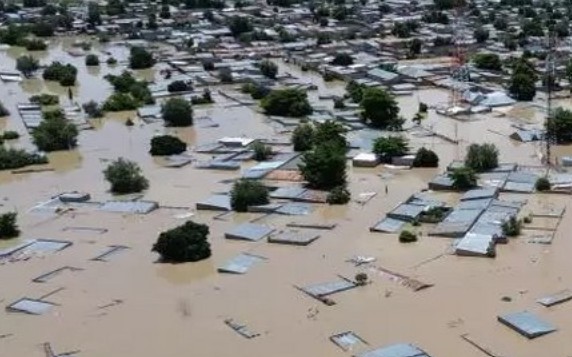Mokwa Floods – Humanitarian Situation Report, Niger State, Nigeria – June 2025

The devastating floods in Mokwa highlight the urgent need to strengthen climate resilience in vulnerable communities in Nigeria, particularly through early warning systems, climate-adapted reconstruction solutions, and the creation of a local emergency fund.
The floods that occurred on May 29 in Mokwa, Niger State – approximately 380 kilometers west of Abuja, Nigeria’s capital – has triggered a major humanitarian crisis, killing at least 200 people and displacing more than 3,000.
Heavy rainfall hit the region overnight, catching residents in their sleep and destroying nearly 500 homes within hours. Survivors, such as Fatima Kontagora, who lost 16 family members, bear witness to the violence of the event. Already vulnerable due to prolonged droughts, the region now faces increasingly frequent and destructive extreme weather events.
Damage to infrastructure – including the collapse of two bridges and the destruction of key roads – is severely hampering the delivery of humanitarian aid. Many families lack shelter, clean water, and basic medical care, significantly increasing the risk of disease outbreaks.
This disaster is a stark reminder of the effects of climate change on rural communities, particularly in sensitive agricultural areas along the Niger River.
Nigeria, a West African country increasingly exposed to climate-related hazards, has experienced a rise in natural disasters in recent years, including prolonged droughts and devastating floods. Major flooding events occurred in 2012, 2020, 2022, and most recently in 2024, affecting hundreds of thousands of people in states such as Kogi, Benue, Anambra, and Niger. These extreme events, often driven by overflowing of the Niger River and its tributaries, have caused loss of life, mass displacement, widespread destruction of homes, and severe agricultural disruptions. This growing pattern of alternating drought and flood events underscores the urgent need to strengthen the resilience of Nigeria’s rural and urban communities to the impacts of climate change.
This dual threat—alternating prolonged droughts and extreme rainfall—is intensifying under the influence of climate change. It increases the vulnerability of both rural and urban populations and reinforces the urgent need to enhance the country’s capacity to withstand natural disasters.
As part of its support for at-risk populations, ADH recommends:
-Establishing community-based early warning and climate risk awareness systems to improve disaster preparedness;
-Integrating resilient reconstruction programs, including elevated housing and safe evacuation routes, to reduce human and material losses;
-Creating a local emergency fund to enable rapid and effective crisis response;
-Strengthening dialogue with local authorities to ensure the specific needs of vulnerable communities are fully reflected in national climate policies.

